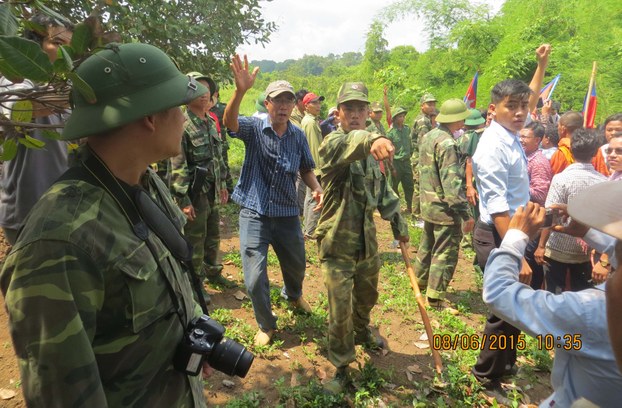Cambodian activists square off with Vietnamese soldiers in border row
| Publisher | Radio Free Asia |
| Publication Date | 8 June 2015 |
| Cite as | Radio Free Asia, Cambodian activists square off with Vietnamese soldiers in border row, 8 June 2015, available at: https://www.refworld.org/docid/5589505351.html [accessed 28 May 2023] |
| Disclaimer | This is not a UNHCR publication. UNHCR is not responsible for, nor does it necessarily endorse, its content. Any views expressed are solely those of the author or publisher and do not necessarily reflect those of UNHCR, the United Nations or its Member States. |
2015-06-08
 Cambodian opposition lawmakers and activists confront Vietnamese soldiers and villagers at the border in Ratanakiri province, June 8, 2015. RFA
Cambodian opposition lawmakers and activists confront Vietnamese soldiers and villagers at the border in Ratanakiri province, June 8, 2015. RFA
Around 200 activists from northeastern Cambodia's Ratanakiri province led by opposition lawmakers confronted dozens of soldiers and villagers from Vietnam Monday in a standoff over the digging of irrigation ponds in a non-demarcated area along the border shared by the two nations.
The activists were met by around 50 Vietnamese soldiers armed with guns and patrol dogs, and Vietnamese villagers, at the edge of the so-called "white zone" of unmarked border territory in Oyadaw district, opposition Cambodia National Rescue Party (CNRP) lawmaker Mao Monivann told RFA's Khmer Service.
After a three-hour standoff, the group from Cambodia pushed forward into the white zone and determined that Vietnam had broken an agreement between the two nations prohibiting development of the area until the border is officially demarcated, said Mao Monivann, who led Monday's inspection.
"Vietnam violated Cambodia's territory by digging seven [irrigation] ponds in unmarked areas," he said.
At least 10 Cambodian police officers were dispatched to the area as Mao Monivann questioned the Vietnamese border officials about why the irrigation ponds had been dug and demanded that they fill them back in within a week, or face further protests.
A Vietnamese officer in charge of the area said the ponds had been dug "a long time ago" and urged the CNRP lawmaker to lodge a protest through diplomatic channels.
"This area was occupied by Vietnamese people a long time ago – they have farmed and planted here," the officer said.
However, a Cambodian villager named Sal Noeuch told RFA that nine different Cambodian families had grown crops on the land before Vietnamese soldiers threw them out in 2012 and claimed the area.
"It used to be my plantation and I farmed it for eight years before they took it away," he said.
Latest incident
Monday's standoff followed an incident last week in which a group of CNRP officials and indigenous villagers from Ratanakiri claimed that guards from Vietnam had threatened to shoot and kill them as they inspected the non-demarcated territory, located between border posts 31 and 39.
The incident prompted Chhay Thy, an official with the provincial office of local rights group Adhoc, to slam Cambodian authorities for not closely monitoring the border, unlike their Vietnamese counterparts.
Conflicts along the 1,228-kilometer (763-mile) Cambodia-Vietnam border have occurred in several other provinces, including Svay Rieng, Kampot, Tbong Khmum and Kampong Cham.
The CNRP has repeatedly called on the government of Prime Minister Hun Sen to re-examine and resolve the border issues with Vietnam, although its efforts have been in vain.
False map claims
Hun Sen on Monday denied allegations that his government had used a "false map" to demarcate the border with Vietnam, saying he would be "struck by lightning" if the accusations were true.
"People are accusing the government of using a false map, but why would it do such a thing?" he asked.
He said that the government "loves Cambodia," and called on all TV stations to rebroadcast a five-hour long speech he gave in 2012 about the border issue with Vietnam.
Many Cambodians are wary of Vietnam's influence over their country's affairs.
An estimated 1.7 million people, or one in four Cambodians, died in what came to be called the "Killing Fields" after the ultra-Communist Khmer Rouge took power in 1975. The regime was unseated when Vietnam invaded the country four years later.
Reported by Ratha Visal for RFA's Khmer Service. Translated by Samean Yun. Written in English by Joshua Lipes.
Link to original story on RFA website
